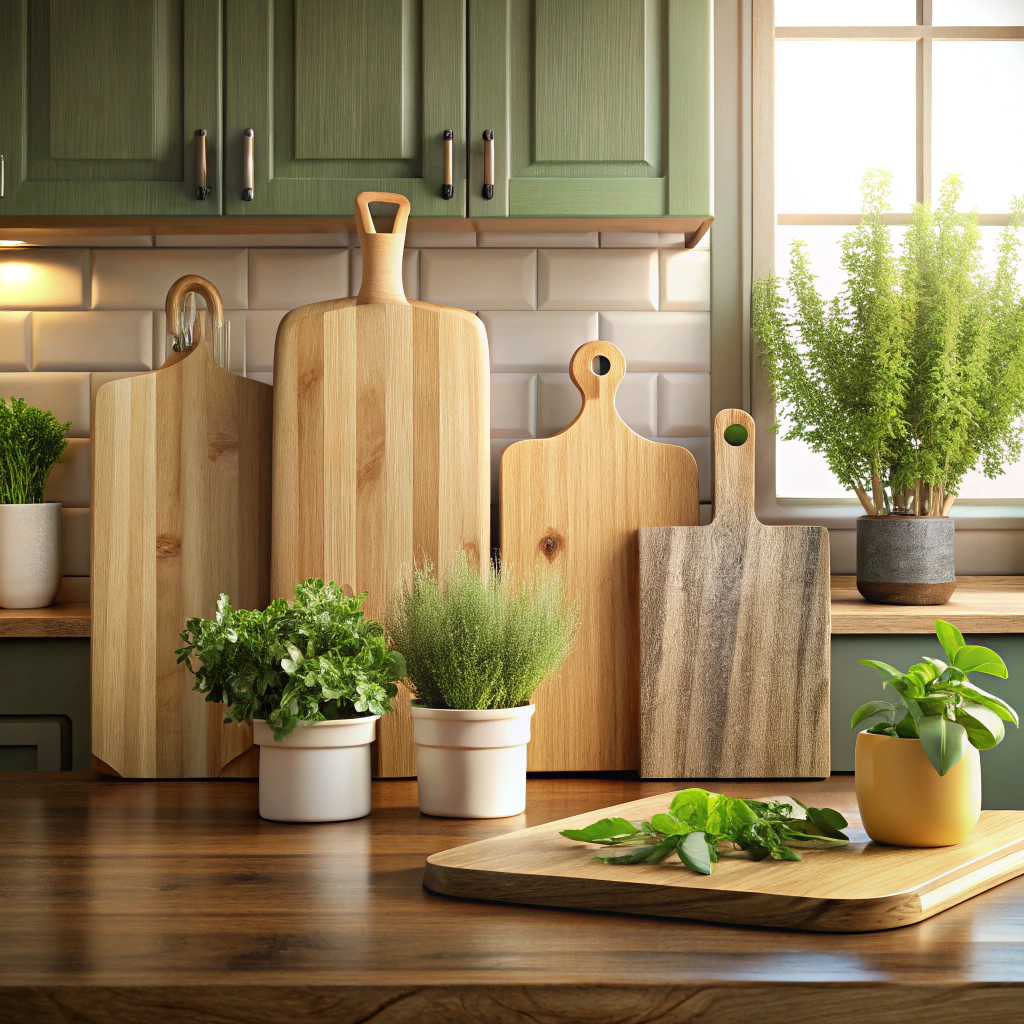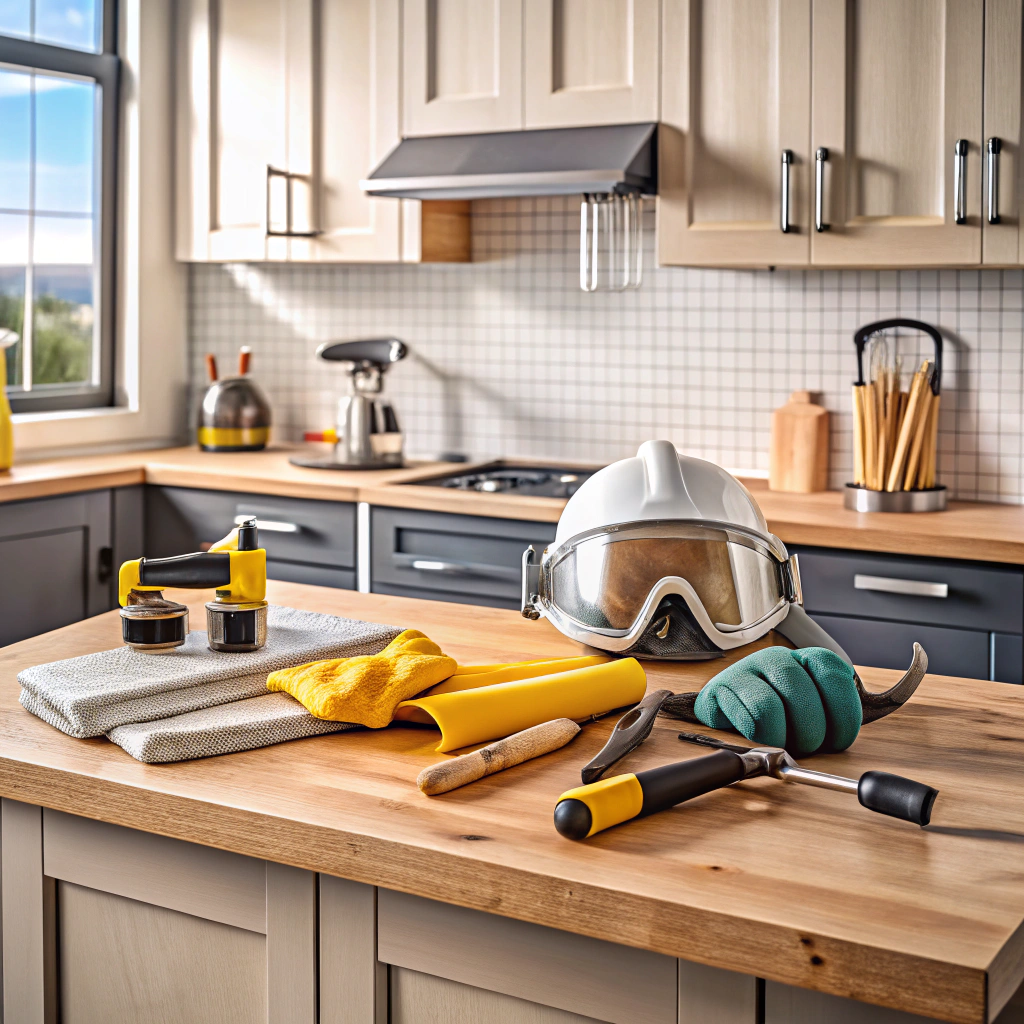Last updated on
Discover the effective ways to eliminate rust from your kitchen sink drain, ensuring a clean and well-maintained home environment.
Do you ever notice rust stains in your kitchen sink drain? It’s a common problem that can make your sink look old and dirty. Not only does it affect the appearance of your sink, but it can also lead to further damage if left untreated.
Fortunately, there are several effective ways to remove rust from your kitchen sink drain and restore its shine. In this article, we’ll share some simple yet effective methods to help you get rid of those pesky rust stains once and for all.
So let’s dive in!
What's Inside
Identifying Rust in Kitchen Sink Drain
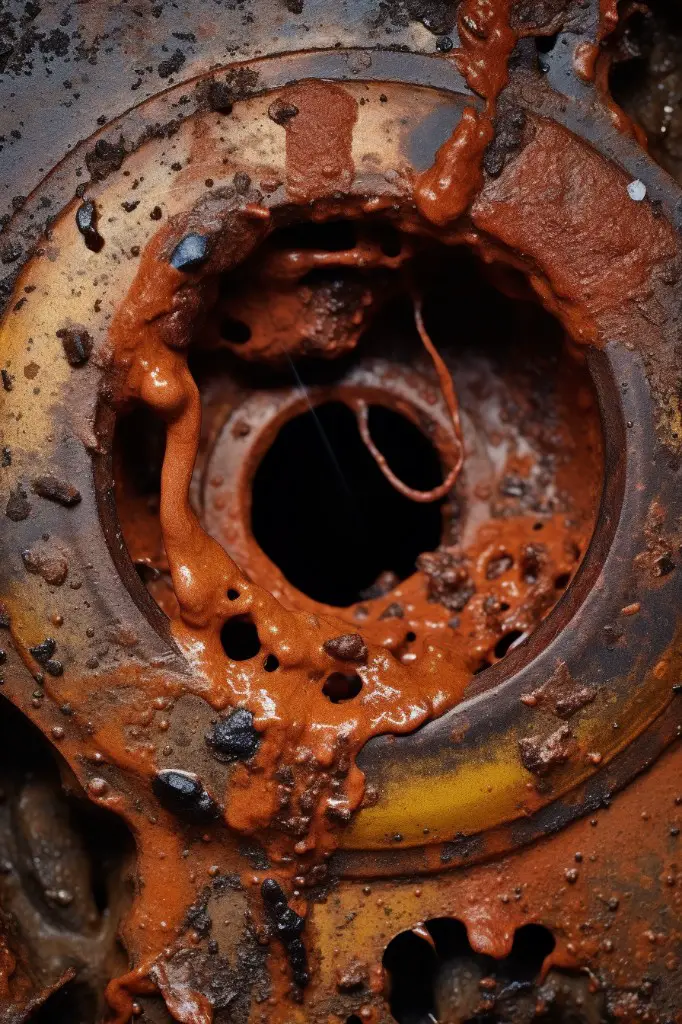
Rust stains are usually reddish-brown and can be caused by several factors such as hard water, metal utensils left in the sink for too long or even old pipes. If you’re unsure whether a stain is rust or not, try wiping it with a cloth soaked in vinegar.
If the color fades away after some time, then it’s likely that you have a rust problem.
It’s important to note that if your kitchen sink drain has been corroded due to prolonged exposure to harsh chemicals or acidic substances like bleach and vinegar; then what appears as “rust” may actually be corrosion damage instead.
Tools and Materials
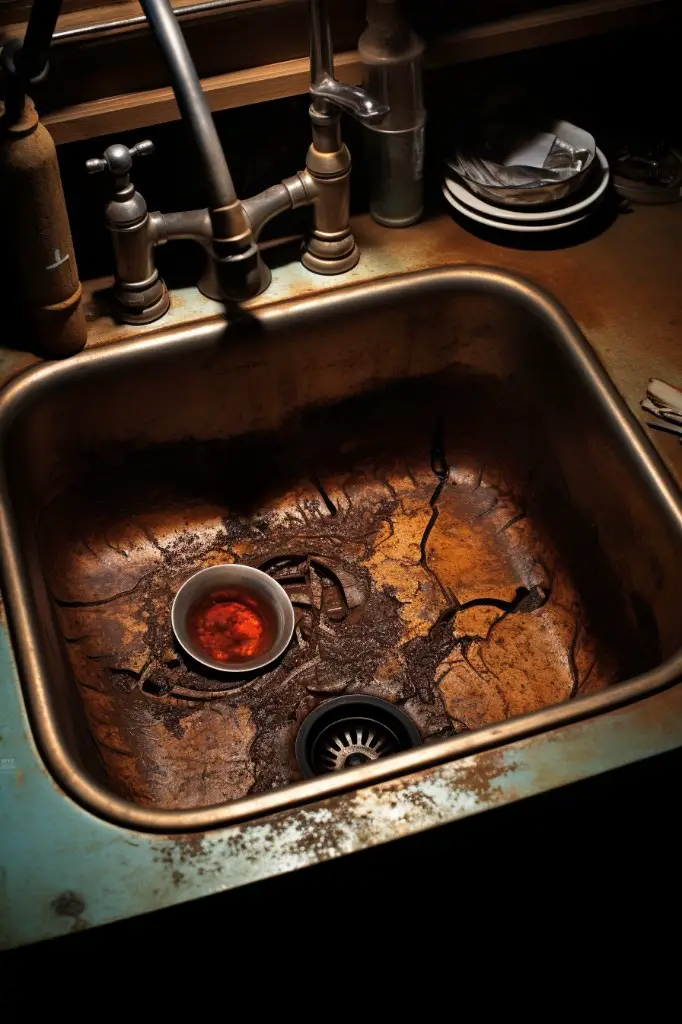
You don’t want to be halfway through the process only to realize that you’re missing something crucial. Here are some of the things you’ll need:
1. Rubber gloves: Rust removal can be harsh on your skin, so protect yourself by wearing rubber gloves.
2. Safety goggles: Protect your eyes from any debris or chemicals that may splash during rust removal.
3. Baking soda: This common household item is a great natural cleaner and can help remove rust stains.
4. Vinegar or lemon juice: Both vinegar and lemon juice contain acid which helps dissolve rust stains.
- Wire brush or pumice stone: These abrasive tools will help scrub away stubborn rust spots in hard-to-reach areas of the sink drain.
- Commercial Rust Remover: If DIY methods fail then commercial products like CLR Calcium Lime Rust Remover could come handy
Safety Precautions During Rust Removal
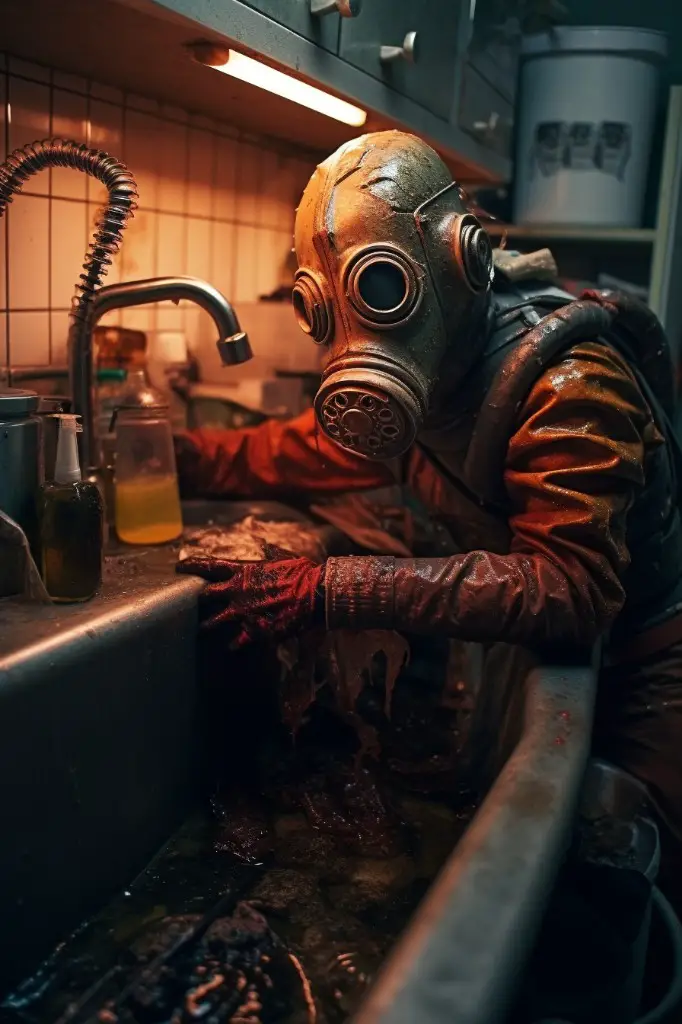
Rust removal can be a messy and potentially hazardous process if not done correctly. Here are some tips to keep in mind:
- Wear protective gear such as gloves, goggles, and a mask to avoid skin irritation or inhalation of harmful chemicals.
- Ensure proper ventilation by opening windows or turning on exhaust fans.
- Keep children and pets away from the work area during the rust removal process.
- Read product labels carefully before using any commercial rust removers.
Prepare to Remove Rust
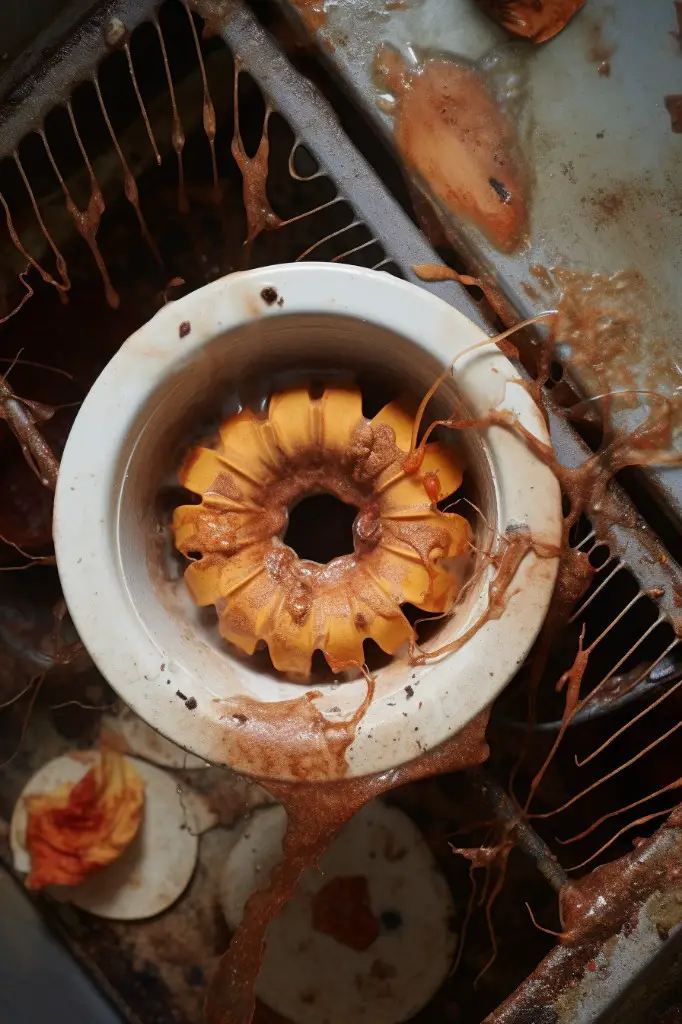
First, make sure you have all the necessary tools and materials on hand. You’ll need gloves to protect your hands from any harsh chemicals or abrasive materials used during the process.
Gather a wire brush or pumice stone for scrubbing away rust stains.
Next, clear out any items that may be obstructing access to your sink drain such as dishes or utensils in the sink basin. This will give you ample space to work with while cleaning.
It’s also important to take safety precautions when working with chemicals like commercial rust removers or natural ingredients like vinegar and lemon juice. Make sure there is proper ventilation in your kitchen by opening windows if possible; otherwise use a fan for air circulation.
Simple DIY Rust Removal Methods
These methods are easy to follow, require minimal effort, and use common household items that you probably already have in your pantry or cleaning supplies.
The dish soap method involves mixing a few drops of dish soap with warm water and scrubbing the affected area with a sponge or brush. This method works well for mild rust stains but may not be effective for heavy buildup.
Another popular DIY method is the vinegar soak technique. Simply pour white vinegar into a spray bottle, saturate the affected area, let it sit for 30 minutes to an hour before scrubbing away any remaining residue.
Baking soda paste can also be used as an alternative solution by mixing baking soda with water until it forms a thick paste consistency then applying this mixture onto rusty areas before leaving it on overnight then rinsing off in morning.
Lemon juice can also work wonders when removing rust stains due its acidic properties which break down iron oxide molecules found within these types of surfaces making them easier than ever before!
Dish Soap Method
All you need is a few drops of dish soap, warm water, and a scrub brush or sponge. Start by mixing the dish soap with warm water in a bowl or bucket.
Then, dip your scrub brush or sponge into the solution and start scrubbing away at the rust stains in your sink drain.
Make sure to apply enough pressure while scrubbing to remove all traces of rust from every nook and cranny in your sink drain. Rinse off any remaining residue with clean water once you’re done.
This method works well for mild cases of rust buildup but may not be as effective for more severe cases where other methods might be required instead.
Vinegar Soak Method
Vinegar contains acetic acid, which helps dissolve the rust buildup and makes it easier to clean. To use this method, you’ll need white vinegar, a bowl or container large enough to fit your sink stopper or strainer basket, and some warm water.
Firstly, remove the sink stopper or strainer basket from your kitchen sink drain. Then mix equal parts of white vinegar with warm water in a bowl or container that can accommodate the size of the removed item(s).
Place them into this solution for at least 30 minutes (or longer if necessary) until all visible signs of rust have disappeared.
After soaking time has elapsed take out items from solution rinse them thoroughly under running tap water before reinserting back into their respective positions in the kitchen sink drain system.
Baking Soda Paste Method
This method involves creating a thick paste by mixing baking soda and water, then applying it directly to the affected area. Allow the mixture to sit for at least 30 minutes before scrubbing with a brush or sponge and rinsing thoroughly with water.
Baking soda is an excellent natural cleaner that can help break down rust stains without damaging your sink’s surface. It’s also safe for use in homes with children and pets since it doesn’t contain any harsh chemicals.
To make the most of this technique, ensure you have enough baking soda on hand as you may need more than one application depending on how severe the rust stain is. Be sure not to leave the mixture on too long as it could cause damage if left unattended for extended periods.
Lemon Juice Technique
Lemons contain citric acid, which acts as a natural rust remover and helps break down the rust stains. To use this technique, cut a lemon in half and squeeze the juice onto the affected area of your sink drain.
Let it sit for about 30 minutes before scrubbing with a brush or sponge.
For tougher stains, you can sprinkle salt on top of the lemon juice to create an abrasive paste that will help lift off stubborn rust deposits. After scrubbing thoroughly, rinse with water and dry with a clean cloth.
This method not only removes rust but also leaves behind a fresh citrus scent in your kitchen sink drain! It’s an eco-friendly solution that doesn’t involve harsh chemicals or expensive products.
Using Natural Ingredients to Remove Rust
Natural methods are safe for the environment, non-toxic, and readily available in most households. One of the most popular natural ingredients used for rust removal is white vinegar.
Simply pour some vinegar into a spray bottle or bowl and apply it directly onto the affected area of your sink drain. Let it sit for about 30 minutes before scrubbing with a brush or sponge.
Another effective method involves using lemon juice mixed with baking soda to create a paste that can be applied on rusty areas of your kitchen sink drain. The acid in lemon juice helps dissolve rust while baking soda acts as an abrasive agent that scrubs away any remaining residue.
If you prefer not to use harsh chemicals, try using salt mixed with lime juice instead! This mixture creates a powerful cleaning solution that can help break down stubborn stains caused by rust buildup over time.
Commercial Rust Removers for Kitchen Sink Drains
These products are readily available in most hardware stores and supermarkets, and they come in different forms such as sprays, gels or liquids. They contain powerful chemicals that can dissolve the rust stains quickly without damaging your sink’s surface.
When using commercial rust removers, it is essential to follow the instructions carefully and wear protective gloves to avoid skin irritation. Most of these products require you to apply them directly on the affected area for a specific time before rinsing with water thoroughly.
While commercial rust removers can be effective at removing stubborn stains, they may not be suitable for all types of sinks or drains. Some materials like copper or brass may react negatively with certain chemicals found in these products leading to discoloration or damage.
Wire Brush Technique
This method requires a bit more elbow grease than some of the other methods, but it can be very effective in removing stubborn rust stains.
To use this method, you’ll need a wire brush that’s appropriate for the size of your sink drain. Begin by wetting the area around the rust stain with water and then scrubbing it gently with the wire brush.
Be sure to apply even pressure and work in circular motions until all of the rust has been removed.
Once you’ve finished scrubbing, rinse away any remaining debris or residue with warm water. You may also want to consider using a commercial cleaner or natural ingredient like vinegar or lemon juice as an additional step after using this technique.
Remember that while this method can be highly effective at removing tough stains, it’s important not to overdo it as excessive force could damage your sink drain pipes.
Pumice Stone
It’s a natural volcanic rock that has been used for centuries to clean and polish various surfaces. To use it, wet the pumice stone and gently rub it over the rust stains in your sink drain.
Be sure to apply light pressure as you work, so you don’t scratch or damage the surface of your sink.
One advantage of using a pumice stone is that it doesn’t require any chemicals or harsh abrasives, making it an eco-friendly option for cleaning rust stains in your kitchen sink drain. However, be careful not to use too much force when scrubbing with a pumice stone as this can cause scratches on delicate surfaces.
After using the pumice stone method, rinse off any residue with water and dry thoroughly with a clean cloth.
Preventing Rust Formation
One of the most effective ways is by keeping your sink dry and clean after each use. Wipe down any excess water or moisture with a towel or cloth, as standing water can lead to rust formation over time.
Another way is by using a protective coating on your sink drain. You can apply a thin layer of petroleum jelly or mineral oil on the surface of your drain once every few weeks.
This will help create a barrier between metal and moisture, preventing rust from forming.
Lastly, avoid leaving metal objects such as knives or utensils in contact with the sink for extended periods as they may cause scratches that could lead to corrosion and eventually rusting.
Proper Sink Drain Maintenance
To avoid the hassle of removing rust stains from your sink, it’s essential to maintain proper care and maintenance of your sink drain.
One way to prevent rust formation is by regularly cleaning the drain with warm water and mild soap. This will help remove any dirt or debris that may cause corrosion over time.
Another effective method for maintaining a clean kitchen sink drain is by using a strainer or stopper. These tools can catch food particles, hair strands, and other debris before they enter the pipes where they can accumulate over time leading to clogs or corrosion.
Lastly, make sure not to pour harsh chemicals down the drain as these substances can corrode metal pipes quickly. Instead of using chemical cleaners try natural alternatives like baking soda mixed with vinegar which are safe for both you and your plumbing system.
Regular Maintenance
Regular maintenance of your kitchen sink drain can help prevent rust formation and keep it in good condition for a long time. One way to maintain your sink drain is by cleaning it regularly with warm water and soap, which helps remove any dirt or debris that may accumulate over time.
Another effective method to prevent rust formation is by using a strainer or stopper in the sink drain. This will help catch any food particles, hair, or other debris that could cause blockages and lead to the accumulation of moisture – one of the primary causes of rust.
Avoid pouring harsh chemicals down your kitchen sink as they can corrode metal pipes leading to further damage over time.
When to Seek Professional Help
A plumber or a professional cleaning service can provide specialized tools and techniques that are not available for regular homeowners. They will be able to assess the extent of damage caused by rust in your sink drain and recommend appropriate solutions.
Moreover, if you notice any leaks or cracks in your kitchen sink due to excessive rust formation, it is best to call a professional immediately. Delaying repairs may lead to more significant problems down the line.
While removing rust from a kitchen sink drain is relatively easy with some simple DIY methods; sometimes seeking expert assistance becomes necessary when things get out of hand.
Replacement Options
Replacing a kitchen sink can seem like a daunting task, but with proper planning and preparation, it can be done easily.
Firstly, you need to choose a new sink that fits perfectly into the existing space. Measure the dimensions of your current sink before purchasing a new one.
You should also consider factors such as material type (stainless steel or porcelain), style (undermount or top mount), and features such as built-in draining boards.
Once you have purchased your new kitchen sink, turn off all water supply lines leading to the old one before removing it from its position carefully. Make sure that all connections are disconnected correctly without causing any damage to plumbing fixtures.
Install your new kitchen drain following manufacturer instructions carefully while ensuring everything is connected correctly for optimal performance.
FAQ
Why is my sink drain rusting?
Your sink drain is rusting primarily due to dissolved iron within water that oxidizes and forms brown-orange rust.
How do you get brown out of sink drain?
To get brown out of a sink drain, create a paste of dish soap and baking soda, apply it to the stained area, leave for a few minutes, and then scrub gently with a cleaning toothbrush or a soft sponge for high-polish sinks.
What are the most common causes of rust formation in kitchen sink drains?
Common causes of rust formation in kitchen sink drains include exposure to moisture, oxygen, and certain chemicals found in food, detergents, and cleaning agents.
What preventive measures can be taken to avoid rusting in the sink drain?
To prevent rusting in the sink drain, regularly clean and dry the sink, avoid using harsh chemicals, and ensure proper water flow.
Are there any eco-friendly methods for removing rust from the kitchen sink drain?
One eco-friendly method for removing rust from the kitchen sink drain is by using a mixture of baking soda and white vinegar.


